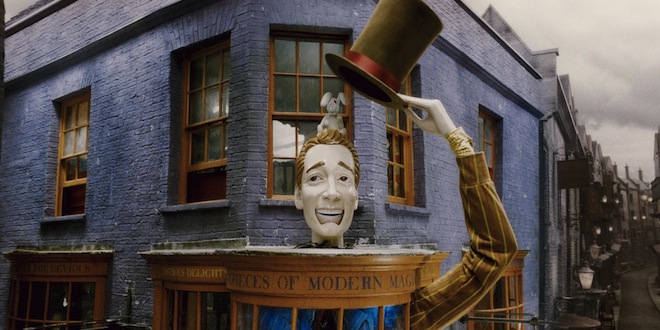Entrepreneurship 101 by Fred and George Weasley
The wizarding world is far from a business-friendly environment. Most of the adults are either employed by the Ministry of Magic or rolling around in inheritance. Then there are all the trade restrictions and a grossly underdeveloped credit system… No wonder there’s a thriving black market for the likes of Mundungus Fletcher to make a career in.
But these dismal economic conditions did not deter Fred and George Weasley. Their career trajectory sure does make for some Forbes-worthy lessons on successful entrepreneurship.

1. Find your niche.
Not everyone has to be a Steve Jobs (definitely a Ravenclaw, btw). The Weasley twins didn’t have some big, unheard-of idea, but what set Weasleys’ Wizard Wheezes apart was their innovations that filled the gaps in Zonko’s offerings. Often, a great business idea is simply an improvement over its past iterations.
Capitalize on your strengths, no matter how silly. Who thought troublemaking could become a lucrative source of income?
2. Know your market.
While finding your niche, it’s also essential to consider your consumer’s needs/wants. Your idea could be ingenious by all accounts, but what’s the point if no one cares about it? The trick is bridging the gap between what you’ve got to offer and what the customer needs.
The Weasley twins, avid pranksters themselves, were able to understand the needs of their peers and had already built their personal brand in their careers as Hogwarts’s resident pranksters. Hence, it didn’t take much for their admirers to turn into eager customers when they ventured into business.
3. Show, don’t tell.
Once you have a good enough understanding of the market, get prototyping. You might need to spend out of your own pockets. Still, it’s worth the expense to get your prospective consumers and investors excited about your venture as well as to display your commitment to it. No one is handing you any gold for a mere musing.
Due to limited funds, Fred and George economized by concentrating on a small batch of sure hits, such as the trick wands that immensely amused Ludo Bagman. Bagman might’ve turned out to be a bad nut, but the twins’ talent was evident in their creation.
Start small and keep it simple.
4. Guard your gold.
Capital crunch is a pain that almost every entrepreneur inevitably needs to bear. While business is all about taking risks, it’s essential to carefully assess the payoffs of your gamble rather than getting enamored by a delicious deal. Resource constraint is all the more reason to scrutinize the legitimacy of every transaction.
There was no way for Fred and George to know that the Ludo Bagman deal would go sour, but their mistake was in staking their entire savings into the bet. Never put all your eggs in one basket, especially when the basket is a shady weirdo.
But the twins learned their lesson quickly. When Harry handed them his Triwizard winnings, they used every Galleon with extreme prudence, enabling them to grow their business and save enough for a shop in a prime property like Diagon Alley.
5. Prototype, test, and repeat.
Prototyping aims to get feedback and refine your offerings. The earlier you involve your consumers in the design process, the more likely you are to end up with a more marketable product and generate excitement amongst your customer base as a side effect.
Of course, follow proper procedures and precautions when testing hazardous products, and certainly don’t recruit unsuspecting underage candidates to test them out. That kind of gimmick only works in the wizarding world, where safety concerns are abysmally low, and the legal system is an absolute joke.
6. Find the wow factor.
Once you’ve caught your customers’ attention, you want to keep them coming. As your business starts showing potential, diversify and keep the market engaged. The best time to capture a market is when it is already abuzz with your arrival – strike when the iron is hot, as they say.
The Weasley twins were continuously expanding their product line. By the time Weasleys’ Wizard Wheezes had set up shop in Diagon Alley, they had an extensive catalog of cheeky products ready to go. As their business progressed, they found a larger potential for their Shield Charm products with the Ministry – something they hadn’t previously given much thought to – inspiring them to innovate in DADA products that turned out to become real money-spinners.

In the end, Fred and George’s story is one of hard work, perseverance, and an unwavering belief in their vision. When you believe in yourself and what you’ve got to offer, no amount of nagging from your mother can keep you down.

